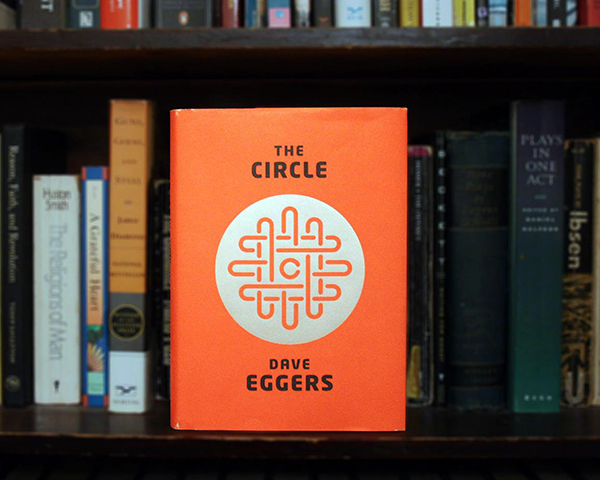 Dave Eggers’ “The Circle” tells the story of an eponymous Internet company in a post-Google, post-Facebook, post-Twitter, post-Amazon near-future dystopian utopia (I’ll explain that shortly). The company is massive and all-encompassing, bringing together ubiquitous search and communications in an ever-widening array of devices and services aimed at providing complete transparency. No project is too ambitious for The Circle, including streaming wearable cameras and a real-time, ubiquitous polling system that comes to represent the ultimate dream of democracy.
Dave Eggers’ “The Circle” tells the story of an eponymous Internet company in a post-Google, post-Facebook, post-Twitter, post-Amazon near-future dystopian utopia (I’ll explain that shortly). The company is massive and all-encompassing, bringing together ubiquitous search and communications in an ever-widening array of devices and services aimed at providing complete transparency. No project is too ambitious for The Circle, including streaming wearable cameras and a real-time, ubiquitous polling system that comes to represent the ultimate dream of democracy.
The story is told through the eyes of Mae Holland, a 24-year-old woman coming to the company on the coattails of a more polished, to-the-manor-born college friend. She is, at first, enamored of the company, and with good reason: Eggers spends considerable swaths of the book detailing the perfect, sprawling corporate campus. It’s not long, though, before things take a dark turn, as, of course, they must.
The book asks many of the right questions: do we give up too much of ourselves by relentlessly sharing our lives online, measuring our successes by how many “likes” we get on Facebook? Is there something fundamentally wrong with having secrets and moments we keep entirely to ourselves? Is a surveillance state — even a voluntary one — worth eliminating most crime at the expense of privacy? Is the unexamined life worth living?
There’s a lot to like about the book. Eggers is obviously no dummy, and, at a certain level, the questions are worth pondering. We’re increasingly a society that tweets and Instagrams every moment; we give our search habits and email to Google, our buying and reading habits to Amazon. In exchange, we get cheaper goods, we get more relevant searches, we get a sense of participation and connectedness with friends and colleagues.
But the book is, in the most predictable sense, a cautionary tale. Mae becomes “transparent,” a movement wherein individuals wear 24-hour-a-day streaming cameras, in constant communication with their real-time viewers through wrist-worn devices. Every moment is scrutinized, and secrets are suspicious.
The book’s technology details are far-fetched, but they’re based in a certain fundamental reality. It’s hard to look at Google Glass in exactly the same way after considering the costs of “The Circle’s” “transparent” lifestyle. The costs to those who live outside the book’s social media world are also well-articulated, if sometimes ham-handedly (one of Mae’s ex-boyfriends makes chandeliers out of antlers, as if these are the only two ways to exist).
At its worst, the book seems reactionary and heavy-handed. There’s little view of life outside The Circle itself, so we don’t have a sense of what Mae’s viewers actually spend their day doing other than watching her. The book makes shameless allusion to the monitoring telescreens in George Orwell’s “1984,” though I was more reminded of the wall-sized monitors of Ray Bradbury’s “Fahrenheit 451.” The surveillance in “The Circle” is not only voluntary, but widely considered desirable. The entire book is told through Mae’s eyes, and she’s, at best, an inconsistent character, sometimes seeming to consist of whatever behavior and consequence the plot demands at any given moment.
For technologists, the book is definitely worth reading. Eggers is an able storyteller, and it does ask many of the right questions. That said, it’s definitely a lesser Eggers work, even if that’s a high standard to meet. Eggers isn’t an expert in technology, and some of the developments he describes will make people who know this stuff roll their eyes, but that’s not the point. Technology is a game of iteration, and the tools and services we use today will seem primitive even five years from now. When Gmail launched (on an April Fool’s Day), many of us were uncertain whether a free gigabyte of email could possibly be true — now cloud-based services offering tens of gigabytes are commonplace. The purpose is reflected in one of the creeds of The Circle: never delete anything.
There were moments in the book that definitely hit home. I was reading it on a tablet (its camera pointed at my face), syncing my progress to the Amazon cloud so I could, at will, swap over to my GPS-enabled phone to continue reading. While I was actually reading the book I’d get pings from Twitter or Facebook or email popping up in the periphery of the screen. The room in which I was sitting has two Kinect cameras always watching, waiting to heed the sound of my voice. It’s easy to deride the book as absurd — and it is — but that’s not to say entirely so.
The last bit that I did find interesting in our current environment is a statement that a character makes about analytics. One of the central themes of the book is that more data equals better decisions: if you track everyone’s every action and decision, and properly analyze the data you receive, you’ll come to the best possible conclusion in every event. (One wacky real-life example: it was published recently that Amazon will be testing the notion of presumptive purchasing, where they may begin automatically shipping items that they’re certain you’ll be buying based on past shopping history.) The benefits of personal inspiration are outweighed by the sheer force of the crowd. One character says:
“The ceaseless pursuit of data to quantify the value of any endeavor is catastrophic to true understanding.”
I don’t know that I agree with that statement out-of-hand, but I don’t believe its counterpoint either. There’s almost certainly a middle ground, though you won’t find one anywhere in “The Circle.”
